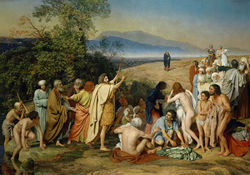UnNews:Orc translated
18 November 2008
(UnNews) A spectacular find to delight all fans of J.R.R.Tolkien has been made. Earlier this week, the archivist of the Bodleian Library in Oxford discovered fragments of manuscripts, mostly on parchment, describing the true life of the Orcs, their customs and language, completely unknown to this date. After preliminary study of the manuscripts, Dr. Enoch Powell, a well-known authority of Tolkien's works, reveals his fascination to UnNews.
"I'm quite sure that Tolkien knew of the manuscripts", says Dr Powell with a boyish gleam in his eyes. "I can picture him sitting on his favorite bench by the river, trying to decide how to transform his findings in a literary form that would be both aesthetic and accurate. By the sight of these manuscripts, there was a man-sized task for him right there."
"It is obvious that Tolkien had to omit some characteristics of the Orcs. If you have read The Lord of the Rings, you certainly know they were no decent fellows. Tolkien mentions their language is 'foul', but after dipping into some of these parchments I can tell you it was also disgusting and almost incomprehensibly obscene."
Powell goes on to explain that the reason for the War of the Rings could just as easily have been a misunderstanding. While there certainly was some kind of a power struggle in Middle Earth, it is altogether possible a large-scale conflict could have been avoided - but for the fateful communication breakdown.
"The Orcs just didn't know any better", explains Powell. "They had been bred in Mordor, breathing the poisonous fumes, immersed in a culture that dictated you just had to talk tough and dirty... it appears that the higher in the hierarchy you were, the more disgusting you had to sound. For instance, 'Nazgúl' translates roughly as One to fuck everyone's mothers (MILF) in modern English. There plainly could be no clear understanding between races."
Powell directs us to a passage concerning a negotiation between Aragorn and an Orc leader concerning the surrender of an Orc stronghold in exchange of some prisoners and a truce. According to Powell, the war could still have been avoided at this point.
| “ | Aragorn looked the orc chief straight in the eyes. The orc returned his gaze, unwavering. Aragorn understood this was an intelligent orc. Some headway could be made towards peace. Tentatively, Aragorn made his offer. "If you solemnly promise not to attack us during the next ten months, we can start discussing some land concessions for your tribe - mostly mountainous, true - but you do live in caves so this should not be a problem."
The Orc regarded him for a moment, nodded to himself, pondered a while and made his reply. "Fuck you, paste-face wanker jerk. We suck dicks like maniacs and you think you can rape our arses with your huge dicks like we were bitches to you. I'll give you a fucking handjob, loser. Suck my dick!" Aragorn was taken aback by these words but decided not to draw hasty conclusions. "Excuse me - do you understand what I am offering you? Look - our army can easily obliterate yours. Doesn't this seem like a good agreement to you?" "Bollocks - go fuck your mother. We cannot wank as much as you shit-eaters can. A mother is a mother, and you can go fuck her, get it, homo gay sapiens?" |
” |
Needless to say, a battle ensued. The Orc chief was the first to be killed. According to the manuscript, Aragorn's sword thrust came as a complete surprise to him. This was the first of the major battles in the War of the Ring - the one Tolkien decided not to mention.
Another misunderstanding happened at the attack on Weathertop. The Nazgúl apparently weren't after the ring but had something completely different in mind.
| “ | Frodo looked down in horror. The little fire the other hobbits had made had been a terrible mistake. It was growing dark, Aragorn was nowhere to be seen, and the presence of the Black Riders could be felt clearly. Ominous dark shapes were approaching the hill in the gathering darkness. Frodo drew his sword. He tried to shout for help but could only croak miserably. The Riders were creeping closer, driven by their horrible need. The hobbits could hear their hissing voices: "Little wanker... dirty little wanker... suck my undead dick..." | ” |
At this point, Aragorn appears and hurts the wraiths who then have to flee. Dr Powell notes that it's not clear what the Nazgúl actually wanted. They apparently sounded threatening and seemed to suggest disgusting acts - but we shouldn't forget the language barrier!
Some linguists - most notably professor K.H. Lahti of the University of Turku, Funland - have already voiced doubt about the validity of the manuscripts, based on the assumption the Orcs could not have known Latin, which appears in several places in the parchments. Dr Powell shrugs off the doubt: "Tolkien mentions potatoes. In the second part of the Lord of the Rings, some Orcs even speak a few French words. Why not Latin? A Nazgúl could have flown to Rome from any part of the world in a matter of days - they could have picked a few words of Latin anywhere, in fact. Just have a look at this chapter about the incident at the Ford of Bruinen."
| “ | Frodo sat uneasily in front of Glorfindel, on the back of the great white horse. The Black Riders had followed them to the Ford, but made no attempt to cross the river. They stopped and shouted to Glorfindel: "We do not give a flying fuck about the ring! Give us the little bastard, we want to kill him by fellatio cum coitus per anum! What say you, bollocks-face?" Glorfindel looked pensive. Suddenly there was a huge roar - the river itself raised up in terrible rage - the Riders could not spur their horses quickly enough, and soon were submerged under water and loose stones. | ” |
According to Powell, the fact that Elrond decided to drown the Riders is proof of one thing only: his Latin was not very good. "He thought the wraiths tried to double-cross Glorfindel; another meaning for the word anus is 'ring'. Again we see the language barrier causing trouble - and of course, after this incident, the war could no longer be postponed."
K.H. Lahti holds the opinion that the manuscripts are apparent forgeries, but Powell denies this adamantly, and challenges Lahti to prove it: "We have already dated the scrolls by the reliable carbon monoxide method. They date back to the period between 890 and 1150 A.D. It is simply not possible that anyone in those times could have had ways to fool the carbon monoxide dating."
The study of the manuscripts is still in its early stages. UnNews will be reporting any new developments as soon as they happen.
Sources[edit | edit source]
- Azog "Sexy Orc Fantasy" BDSM, February 17th, 2008
- Kor The Scrollkeeper "Think Like An Orc" Role Playing, January 21, 2000
- Golfimbul "ORCS" Catalysis, November 10, 2005

